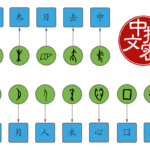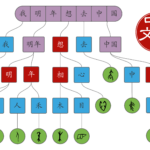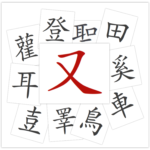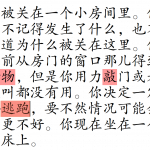Articles in the ‘Vocabulary’ category Page 5
-
The building blocks of Chinese, part 2: Basic characters, components and radicals
Most Chinese characters are compounds consisting of two or more components, but some components are in themselves compounds that can be further broken down. But how do you know where to stop? And how do you learn and remember the most basic building blocks?
Read → -
The building blocks of Chinese, part 1: Chinese characters and words in a nutshell
Learning to read and write Chinese is a daunting task, but the challenge becomes more manageable if you focus on learning the building blocks, learning how components form characters and how characters form words. This article is the first part in a series helping adult students make sens of Chinese characters.
Read → -
Chinese language logging, part 3: Tools and resources for keeping track of your learning
Logging you language learning can be very useful, and there are many tools and resources out there to help you, but which are the best and how do you use them?Logging you language learning can be very useful, and there are many tools and resources out there to help you, but which are the best and how do you use them?
Read → -
The benefits of using Wikipedia to look up words when learning Chinese
Wikipedia is an encyclopedia, not a dictionary, but did you know that it can be better than a dictionary for looking up words when learning Chinese?
Read → -
The new HSK 3.0: What you need to know
On July 1st, 2021, a new Chinese proficiency standard takes effect. This will have big consequences for the HSK, the most widely used proficiency test for non-native speakers. What are these changes and what do they mean for you as a student?
Read → -
Lost in transcription: Saylaw, Ice Island and Aristotle
Names of people and places can be quite different in different languages, sometimes so different that it causes headaches for second language learners. Do you know the world’s best footballer, Saylaw? What about Yàlǐshìduōdé? Or are you lost in transcription too?
Read → -
Chinese language logging, part 1: Why and how to track your progress
How much time are you investing into learning Chinese? Or is it maybe better to talk about it using a unit other than time, such as how many books you’ve read? Are you reading more than you’re writing? Or is listening, speaking, reading and writing maybe the wrong labels to use?
Read → -
My best advice on how to learn Chinese characters
This is an overview of how to learn Chinese characters, including understanding how they work, how to learn to read and write them, as well as how to remember the characters you have learnt. Tools and resources related to characters are also covered!
Read → -
Are simplified characters really simpler to learn?
Are simplified characters easier to learn? They have fewer strokes, but quicker to write doesn’t necessarily mean easier to learn! The simplified vs. traditional characters debate has been going on for a long time, mostly based on emotion. In this guest article, Ash Henson from Outlier Linguistics strives to add reason to the mix and answer the question of whether simplified characters are actually simpler to learn.
Read → -
An introduction to extensive reading for Chinese learners
Too many students of Chinese spend most of their time reading a small number of difficult texts, whereas they would actually be much better off reading a larger number of easier content. Are you focusing on extensive reading enough?
Read →









